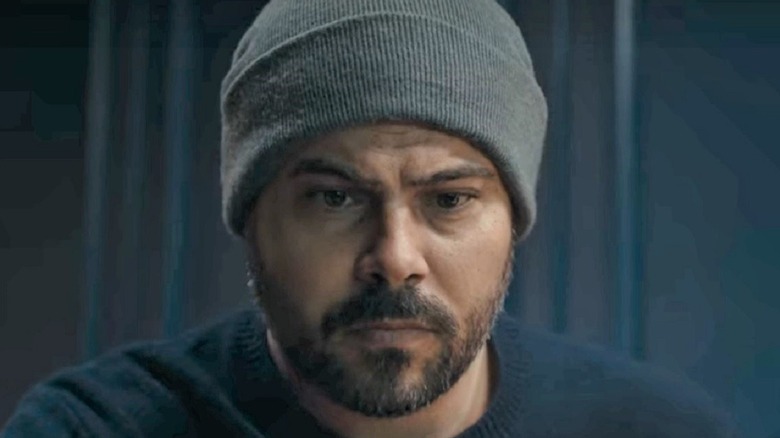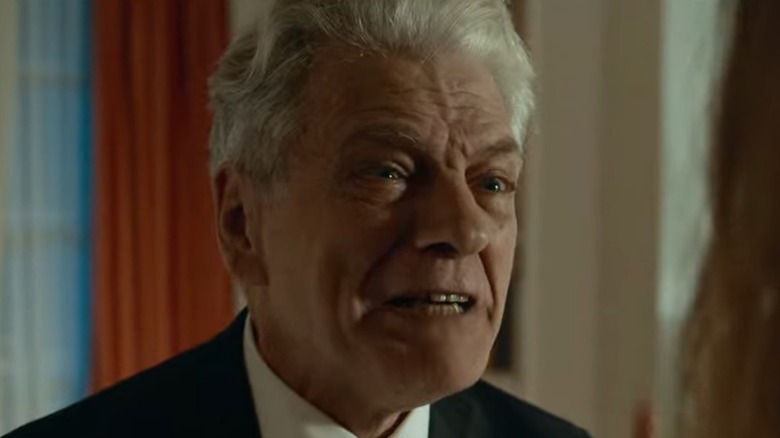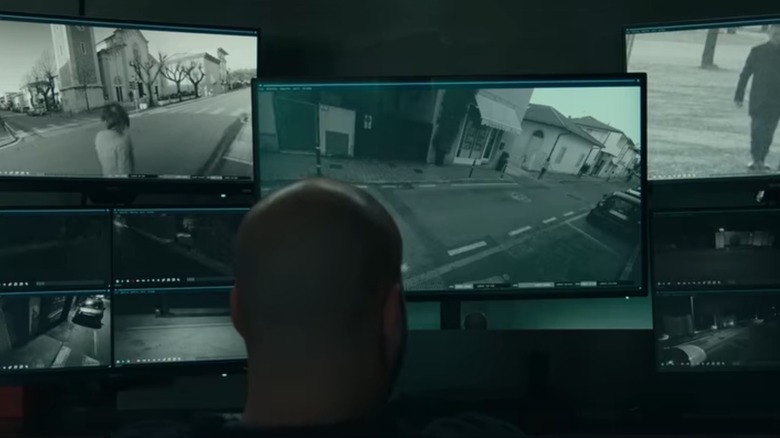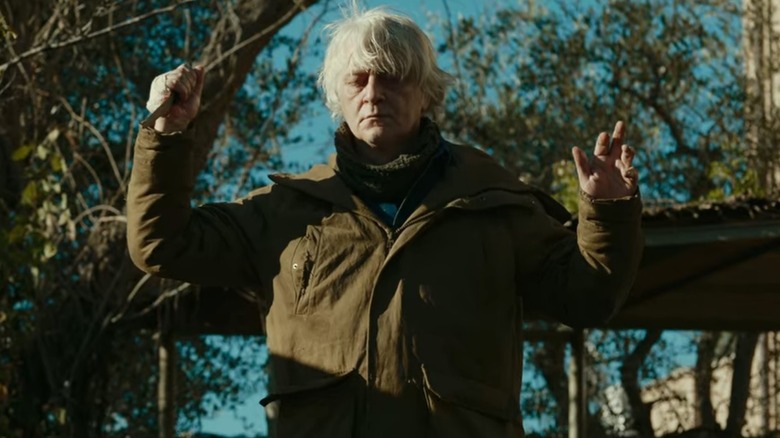The Ending Of Security Explained
Can you tell if somebody is a criminal just by the way they behave? While many in the ritzy Italian resort town of Forte dei Marmi may think they can, a series of shocking events will show them otherwise. In the Netflix mystery "Security," which viewers are currently watching in droves, the notion of who is a protector and who is a predator gets turned on its head.
Roberto (Marco D'Amore) and his wife Claudia (Maya Sansa) are prominent citizens of Forte dei Marmi. He operates the town's extensive private security network and she is a candidate for mayor running on a tough-on-crime platform. When a teenager named Maria (Beatrice Grannò) is found wandering the streets of a wealthy neighborhood badly beaten and crying for help the town is sent into a frenzy. Maria's father Walter (Tommaso Ragno) is the prime suspect in the crime thanks to his history of alcoholism and a disturbing accusation of predatory behavior from his past. However, as Roberto uses his access to the hundreds of video cameras he has installed around town to investigate the crime, he comes to realize that nothing about the incident is quite what it seems.
With Claudia's mayoral campaign kicking into high gear thanks to support from local wealthy tastemaker Curzio Pilati (Fabrizio Bentivoglio), tensions between her, Roberto, and their daughter Angela (Ludovica Martino) begin to rise. When Roberto finally gets to the bottom of exactly what happened on the night that Maria was assaulted everything comes to a head.
The truth about Maria's assault is uncovered
Like many successful whodunit mysteries before it, "Security" provides a large list of potential suspects throughout the course of its story. But when all the pieces of the puzzle are assembled, it's revealed that Pilati was responsible for the assault, among other crimes.
The extent of Pilati's involvement comes to light when local bad boy Dario (Giulio Pranno), who was seen with Maria on the night she was assaulted, comes clean about exactly what went down. After meeting him at a beachside restaurant, Pilati began lending his house to Dario so that the young man had somewhere to bring his hookups. What Dario didn't realize is that Pilati, who suffers from an extreme phobia of direct human touch, was filming the encounters without consent.
On the night that Dario brought Maria to Pilati's house, the older man plied her with alcohol and then drugged her with painkillers until she passed out. He then attempted to touch her in hopes that he would be able to do so without experiencing the intense symptoms of his phobia. When it didn't work, he panicked and beat her severely before sending her back out onto the streets.
The revelation of Pilati's crime isn't just shocking because of his status in the community. It also illuminates a disturbing truth about Claudia's mayoral campaign.
Pilati's crime casts Claudia's mayoral campaign in a new light
A large focus of Claudia's mayoral campaign is her desire to return Forte dei Marmi to a more idealistic time when crime was less of an issue. She places the blame for the town's crime problems on people she calls "undesirables." However, as the events of the movie show, these "undesirables" are nothing more than a convenient scapegoat.
The perpetrator of one of the town's worst crimes in recent memory is one of her campaign's major backers. A wealthy and well-connected man like Pilati clearly wasn't who she had in mind when she spoke out against "undesirables," but he is guilty of both a terrible assault and filming people's sexual exploits without their consent.
She also helped Pilati conceal his role in Maria's assault by having Roberto's assistant delete footage from his home security system. Although she claims she did this for other political reasons, by doing so, she played a large role in covering up his crimes.
There's also the issue of Walter. Early in the film, it's made clear that he's an alleged pedophile, and later we learn that this stems from an incident wherein Claudia accused him of inappropriately exposing himself to Angela when she was a child. But when Angela finally decides to tell her version of the story, it becomes clear that while Walter was inappropriately drunk at the time the incident occurred, he did not purposely expose himself to her, and labeling him as a predator was inaccurate and damaging.
Claudia has built an entire public persona around her tough-on-crime stances. When looking at the evidence, though, it's hard to see her as anything other than a hypocrite who uses "undesirables" such as Walter as scapegoats to distract from the misdeeds of herself and her associates.
Roberto gets to the bottom of everything
Roberto's role in the events of "Security" is one of the most complex. As the head of the town's main security operation, he is deeply intertwined with Claudia's tough-on-crime persona. However, as the story goes on and he's able to unravel the many secrets, it becomes clear that he has conflicting feelings about his role in that work.
In uncovering the truth about both Pilati and Walter, Roberto seems to have a realization about how his security network is actually used. His cameras are intended to keep the members of his community safe. However, they have increasingly become a tool for the wealthy elites to not only perpetrate their own crimes but also shift the blame onto the "undesirables" of society.
Even when the cameras do catch evidence of a crime committed by the wealthy elite, such as in the case of Pilati assaulting Maria, they have the power to simply erase the footage. His network is meant to provide transparency and accountability. However, it has been corrupted by capitalism and now mostly serves as a tool for the elites to retain power over the "undesirables."
Walter's tragic fate
Even after Angela reveals that Walter was falsely accused of preying on her as a child, it's clear that he's struggling to bear the burden of the way his alcoholism has affected his daughter. Believing Dario is responsible for Maria's assault, Walter attacks him in his house. He's pulled off the young man, though, and sent outside to face the police.
When the police try to subdue Walter, he instead pulls out a knife and advances toward them until they shoot him dead. "Security" is a crime thriller and until this point, it was one without a murder. While Maria was the first victim, Walter eventually becomes one, as well. He was falsely accused of a serious crime that turned him into a social pariah, all in the name of cracking down on crime. He had problems with alcohol abuse before all that happened but it's clear that being scapegoated did not help the situation.
After Walter's death, Roberto begins a project of his own. He combs through all the footage he can find and pieces together the full narrative of what happened: Maria was brought to Pilati's house, he drugged and assaulted her, Walter was blamed for it, which opened old wounds and drove him to a desperate action. Instead of going to the police, Roberto compiles the clips of these events and broadcasts them to the security systems of all his clients.
While the wealthy elite of Forte dei Marmi were able to use his surveillance network to their advantage for so many years, once Roberto realized what was actually going on, he decided to make sure his cameras and their reach were being used for their intended purpose.




